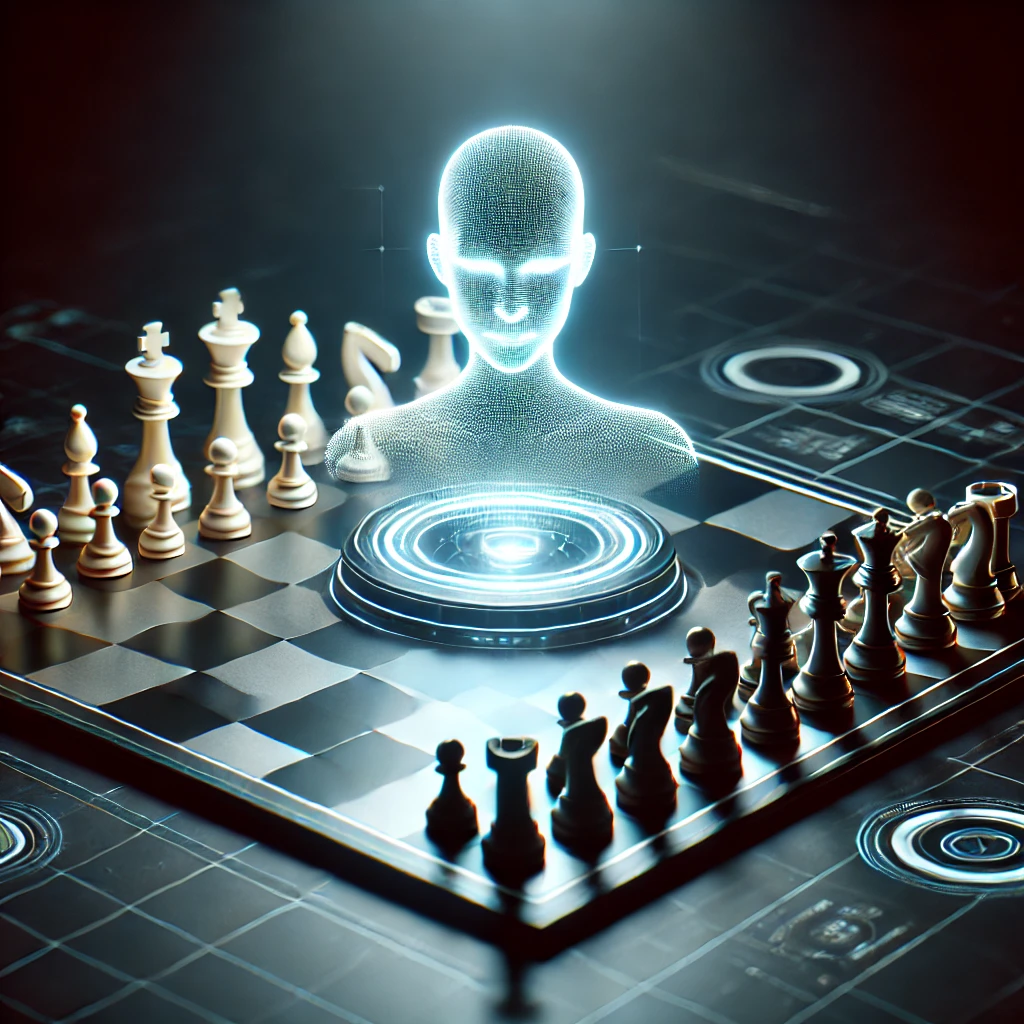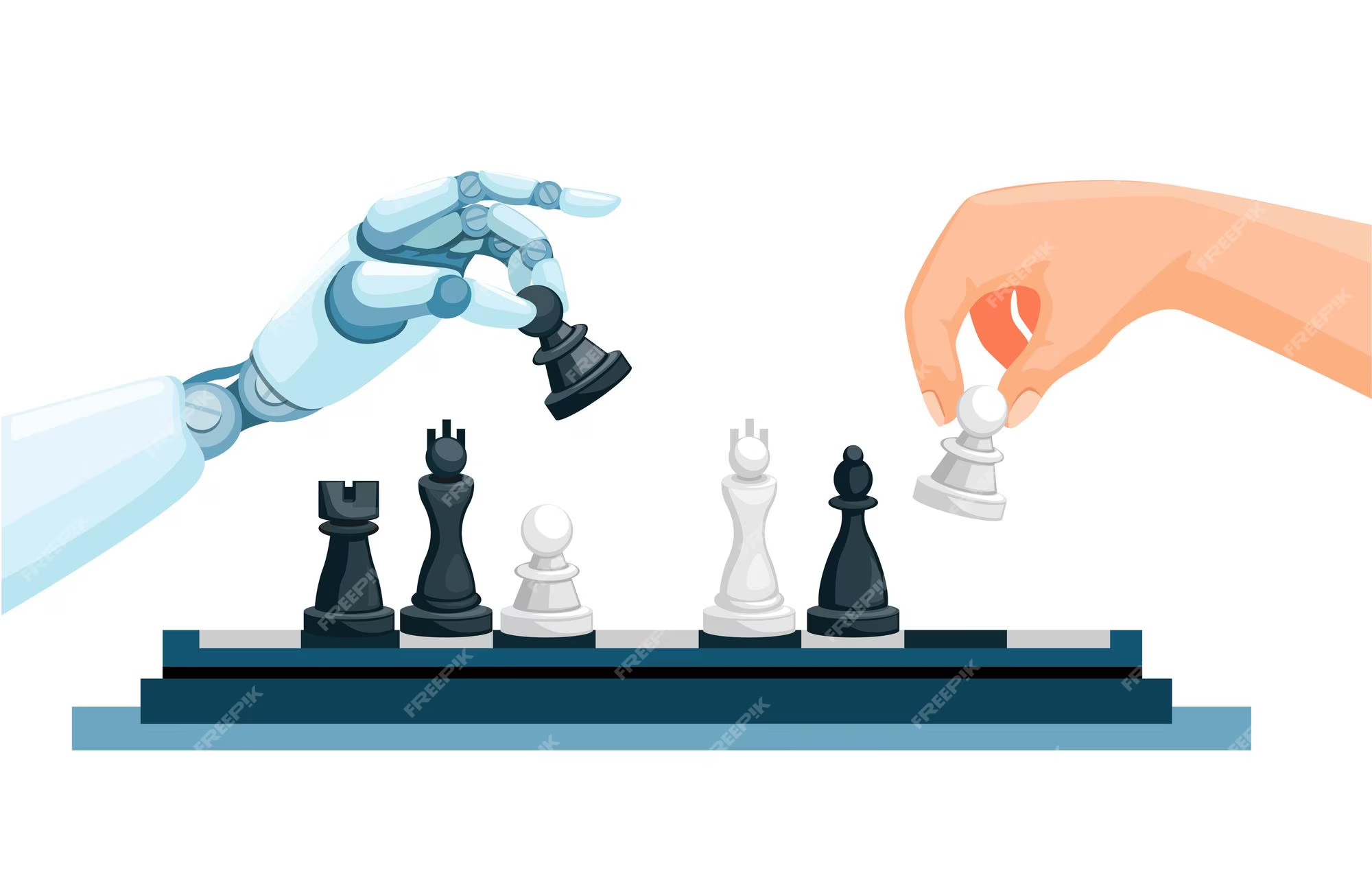Introduction
Artificial Intelligence (AI) has revolutionized chess, transforming how the game is played, learned, and analyzed. From the dominance of AI-powered engines like Stockfish and AlphaZero to AI-assisted training tools, AI has reshaped chess at all levels. This article explores AI’s role in chess, its historical evolution, modern applications, and its impact on players and the broader chess ecosystem.

A Brief History of AI in Chess
1. Early Attempts at Chess-Playing Machines
The idea of machines playing chess dates back to the 18th century with the Mechanical Turk, a fake chess-playing machine that actually hid a human operator. The first real attempts at computer chess began in the 1950s when Alan Turing created one of the earliest chess algorithms, though computers lacked the power to execute it effectively.
2. The Rise of Chess Engines
In the late 20th century, chess engines began to emerge, with IBM’s Deep Blue famously defeating World Chess Champion Garry Kasparov in 1997. This victory marked a turning point, proving that computers could surpass human players in chess. Engines like Fritz, Rybka, and Houdini further advanced chess AI by using brute-force calculations and evaluation functions.
3. AlphaZero and Neural Networks
The next major breakthrough came in 2017 when Google’s DeepMind introduced AlphaZero, a neural network-based AI. Unlike traditional engines relying on brute-force search, AlphaZero used deep reinforcement learning, playing against itself millions of times to develop superior strategies. In just four hours of training, it defeated Stockfish, the strongest traditional chess engine at the time.
How AI is Used in Chess Today
1. Chess Engines and Analysis
AI-powered engines like Stockfish, Lc0 (Leela Chess Zero), and AlphaZero are used for deep analysis. Players at all levels use these tools to evaluate positions, find best moves, and prepare opening strategies. The integration of AI in platforms like Lichess and Chess.com allows players to analyze their games instantly.
2. AI in Chess Training
AI-based training tools have democratized chess learning. Some key AI applications include:
- Blunder Detection: AI identifies mistakes and suggests improvements.
- Move Suggestions: AI offers the best possible moves in a given position.
- Adaptive Training: AI customizes lessons based on a player’s strengths and weaknesses.
- Endgame Tablebases: AI provides perfect endgame solutions with databases covering millions of positions.
3. AI in Chess Opening Preparation
Modern chess players rely on AI to refine their opening repertoire. By analyzing millions of games and simulating potential variations, AI helps players prepare against specific opponents, find novelties, and understand deep strategic concepts.
You can prepare yourself for chess and to understand Artificial Intelligence and Chess Best Online Chess Academy in India – kingdomofchess.com
4. AI in Competitive Play
AI is widely used in top-level tournaments for:
- Pre-game Preparation: Grandmasters use AI to develop new strategies and counter opponents’ playing styles.
- Post-game Analysis: AI evaluates games with pinpoint accuracy, highlighting missed opportunities and optimal moves.
- Cheating Detection: AI-based algorithms detect unnatural play patterns to prevent cheating in online chess.
Playing Chess Against AI
Playing chess against AI is now accessible to everyone, from beginners to grandmasters. AI-powered chess platforms offer different difficulty levels, allowing players to challenge themselves against increasingly strong opponents.
1. Where to Play Chess Against AI
- Chess.com: Offers AI opponents of various strengths, from beginner to master level.
- Lichess: Provides free AI-powered chess games with Stockfish at different difficulty levels.
- Play Magnus: A unique app that lets you play against AI simulating Magnus Carlsen’s playing style at different ages.
- Standalone Chess Engines: Programs like Stockfish and Komodo can be downloaded to play against an AI offline.
2. Strategies for Playing Against AI
- Start at an Appropriate Level: Begin with an AI opponent close to your skill level.
- Learn from Your Mistakes: Use AI analysis to understand where you went wrong.
- Experiment with Different Strategies: AI allows risk-free experimentation with various tactics and openings.
- Focus on Endgames: Practicing AI-generated endgame scenarios can improve your overall play.
3. The Benefits of Playing Against AI
- Instant Feedback: AI provides real-time evaluation of moves and alternatives.
- Endless Learning Opportunities: AI never tires, allowing players to practice anytime.
- Personalized Training: AI adapts to a player’s style and weaknesses for customized learning.
The Impact of AI on Chess
1. Evolution of Chess Strategies
AI has introduced unconventional ideas that challenge human understanding of chess. It has shown that aggressive sacrifices, material imbalances, and dynamic play often outperform traditional principles. This has led to a shift in how players approach the game, embracing AI-driven creativity.
2. Making Chess More Accessible
AI has made chess more approachable for beginners by offering interactive learning experiences. Platforms like Chess.com and Lichess use AI-powered chatbots and adaptive puzzles to enhance engagement.
3. The Decline of Human Supremacy
With AI engines far surpassing human abilities, the gap between human and computer play has widened. While this means fewer surprises in competitive chess, it has also inspired new ways for players to improve and understand the game at a deeper level.
4. The Rise of AI-assisted Chess
AI is not just an opponent but also a partner. AI-assisted play, where humans use AI suggestions to refine their strategy, is becoming more common, especially in correspondence chess and advanced training methods.
Ethical Concerns and Challenges
1. AI and Cheating
AI-driven cheating in online chess is a major concern. With engines capable of finding perfect moves instantly, governing bodies have implemented advanced anti-cheating measures. Tournaments use AI to analyze player behavior and flag suspicious activity.
2. The Debate on AI’s Role in Chess
Some argue that AI’s dominance takes away the human element of chess. The fear is that reliance on AI could reduce creativity and make the game overly mechanical. Others believe AI enhances chess by pushing human players to new heights.
3. AI’s Influence on Over-the-Board Play
While AI has shaped modern chess preparation, over-the-board play still demands human intuition, psychology, and deep understanding beyond AI’s recommendations. The challenge is balancing AI’s insights with the unique aspects of human play.
The Future of AI in Chess
1. Advancements in AI Technology
AI in chess is still evolving. Future developments may include:
- Stronger Neural Networks: AI engines will continue improving with more refined learning algorithms.
- More Human-like AI: AI that mimics human intuition rather than brute-force calculations.
- Real-time AI Training: Players may get instant, personalized AI-driven coaching.
2. AI and Hybrid Chess Formats
AI could lead to new hybrid chess formats where players collaborate with AI in competitive settings. This could redefine chess competitions and add a new dimension to the game.
3. AI in Chess Broadcasting
AI-driven insights and commentary could enhance chess broadcasts, making them more accessible to casual viewers. Real-time win predictions, move evaluations, and AI-assisted storytelling could attract a broader audience.
Conclusion
We have explored Artificial Intelligence and Chess, AI has profoundly impacted chess, from improving training methods to revolutionizing gameplay. While it presents ethical challenges, AI has undeniably enriched the chess experience, making it more accessible, educational, and competitive. As AI continues to evolve, its role in chess will only expand, shaping the future of the game in exciting new ways.



